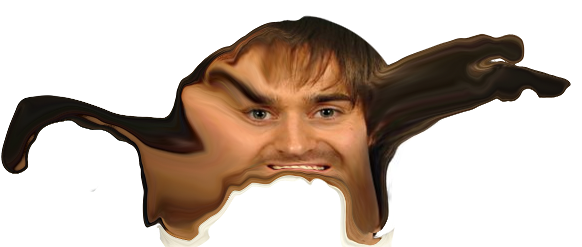
hat tip gr8previne
No idea what's actually going on here but this reminds me of Ender's Game (the book) where two kids change world opinion using "the internet."

hat tip gr8previne
No idea what's actually going on here but this reminds me of Ender's Game (the book) where two kids change world opinion using "the internet."
Found a rather strange article in the Miami New Times: Paddy Johnson Schooled Locals on Net Art and the History of Blogging. Not sure how much of it's Johnson and how much is New Times writer Neil Vazquez, but the articles brims with wrong information.
For a blogger-turned-nonprofit who still maintains a strong presence outside the clutches of Zuckerberg, et al, Johnson is remarkably non-ebullient about her chosen mode of communication.
Back in the early days of the web, intrepid internet users (AKA nerds) would spend long spans venting about things they were passionate about, without paying any attention to how to commercialize their virtual products. In the same way, artists often produce work they're passionate about and then worry about the messy business of selling their art later.
OK, so far, if by nerds you mean DailyKos, Wonkette, Jane Hamsher, Josh Marshall, James Wolcott...
After 2010, the web took a different turn. Google changed the way it filtered and organized its search results from organic traffic to a system that tips the table in favor of large media companies. Yet despite the recent coma-induced state of the independent web...
More on this so-called "filtering" below, but is Johnson saying her website, Art F City, is coma-inducing?
"Net art didn't happen on the computers themselves, but in the interaction or communication between computers," Johnson muses as she clicks through a series of screenshots and GIFs from early GeoCities sites. From 2000 to 2005, the independent web was so popular that some prominent voices within the art establishment were calling for the death of imagery. "It seems crazy to say this today, but a lot of artists felt that since images were so easily available on the web, no new images needed to be created," Johnson explains.
This is all highly debatable, but here's where it gets really bizarre:
By 2007, the independent web had burst, along with the housing bubble. Too much private investment, along with the rise of social media, forced Google to cordon off parts of the web accessible via its search engine, essentially creating a mainstream commercial web that forced the small voices out and sites like BuzzFeed in.
Google has made some changes to its algorithm to favor recency and to tailor results for a user's history and IP address. It caches content on local servers for quicker delivery. All this has been noted by indies and griped about (or not). Johnson has been saying for years that Google filters search results in favor of "large media companies" -- I've seen no evidence of this myself -- tommoody.us pages continue to bob at the top of searches like shiny apples, and I am constantly receiving emails asking to advertise on my site, presumably because it does well in search.
And to the extent media companies are "favored" it would mainly be a problem if you blog about celebrities. Possibly that is a matter of concern for Art F City. As for Google "cordoning off parts of the web" -- what? Where is the proof of this?
While the independent web might be dead today, and the future of blogging in general is pretty murky, the influence of net aesthetics can still be felt. Scrolling through your Tumblr or Instagram feed will likely land you on the work of fan-artists, GIFers, or nostalgic millennials eager to reappropriate the early net style they grew up with. Though they're out of business, blog-based looks are certainly not out of style.
Naked Capitalism recently did a round-up of "is blogging dead" thinkpieces and opines that the end is greatly exaggerated, noting that "if you want to hammer away at a set of ideas in long form, there’s still nothing like a blog." For Paddy Johnson to be going around telling lecture audiences that the blog is dead and that blog-inspired art is a relic, she is basically saying her own site is a not a valid alternative to the social media borg. I don't understand why anyone would do that.
There is no question that the "blogosphere," as it was informally constituted in the mid-'00s, has lost the coherence and purpose it might once have had. But individual's websites still exist and are crawled by hundreds of bots looking for content. Artists still make web pages, many with the blog format because it's easy to install. This indie content can be aggregated into an RSS feed as informative as any "major media" front page. To say this is dead and Facebook/Instagam or Tumblr are "the web" now is not exactly "fighting the powers that be."
Update: Marco Arment ponders whether Google changed the way the blogs are ranked or searched and says, nah, the problem is competition from social media: "Everyone’s spending increasingly more consumption time dicking around in apps and snacking on bite-sized social content instead of browsing websites and searching Google."

reneabythe: honey, it's liquified, not smeared
tommoody: honey, I know (are you male or female?)
This is track #5 on the Discreet Mutations LP release.
I had posted a couple of incarnations of "Bass Transitions" back in the free download era. This version is chock-a-block with house-y organ stabs. There is a more than usual amount of song development here! The screaming wah-ed out softsynth part in the middle is possibly a bit jarring but I felt the song needed this so that the spacy counterpoint thing that follows comes as a soothing relief.
Many thanks to all who've purchased, listened to, or faved "Discreet Mutations" so far.
If you want to support this blog -- which endures like a stubborn flame while millions sink into the dark corporate miasma of "social media" -- buying digital LPs or tapes is the way to go.
But only do it if you like the music -- am not looking for indulgent teeth-gritting from people who hate electronic beat-oriented tunes.